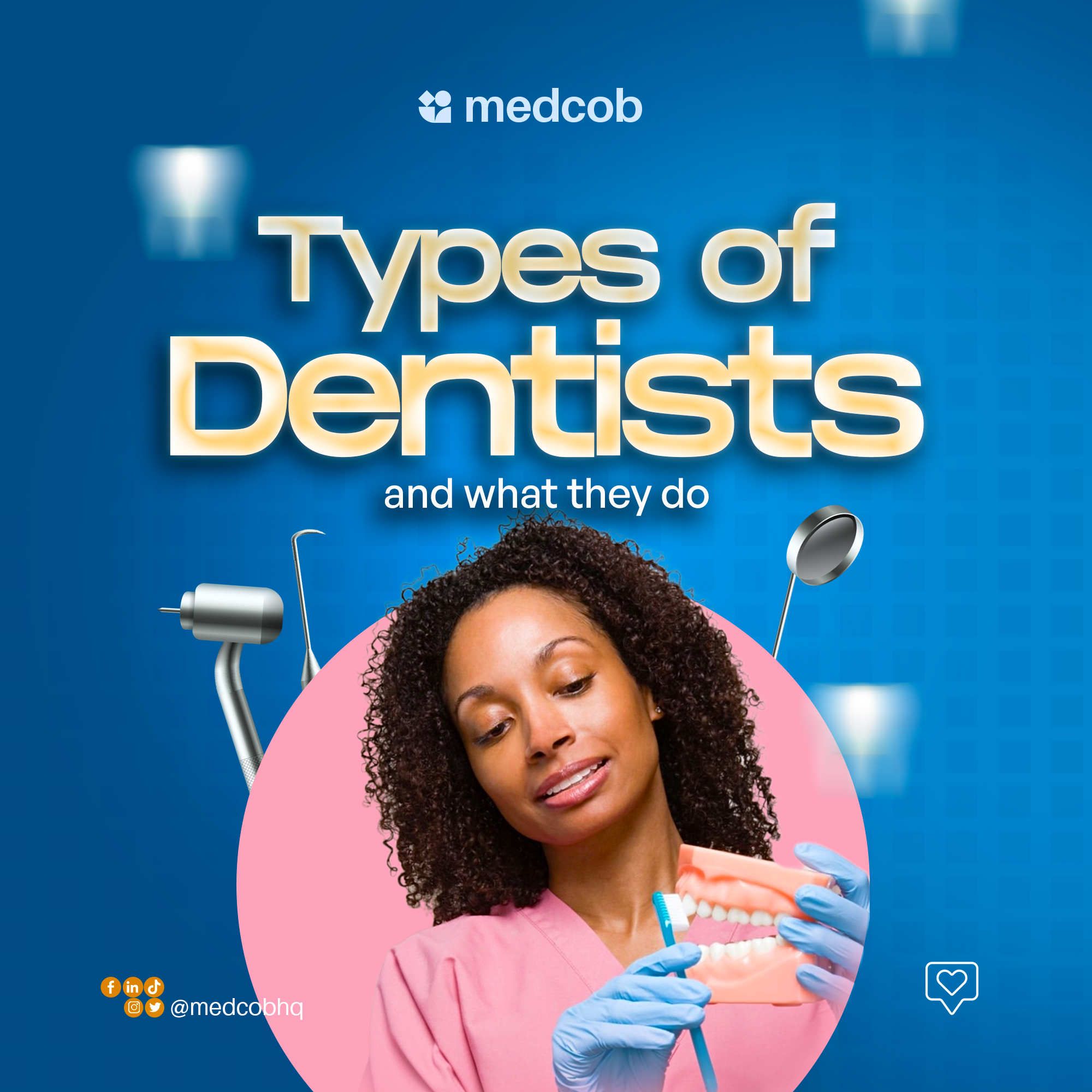
In case you didn't know, there is more to Dentistry than tooth extraction and filling. Oh yes, Dentistry is one of the more sophisticated fields in the "healthdom" and, like internal medicine and Surgery, has several specialties committed to catering to different aspects of oral health. The number of specialties recognized varies depending on the country. This article will explore, generally, the different types of dentists and what they do.
Endodontist
An Endodontist, as the prefix "Endo-" implies, is responsible for diagnosing, treating, and preventing infections and injuries in the human dental pulp or the nerve of the tooth. To achieve this they may perform root canal treatments or other types of surgical root procedures.
Orthodontist
If you have not used braces yourself then you must have seen one. An Orthodontist is a dentist that employs braces and other corrective devices to straighten the teeth by moving them through the bone structure. Orthodontics and dentofacial orthopedics is a branch of dentistry that diagnoses, prevents, and corrects malocclusion, as well as neuromuscular and skeletal abnormalities of the developing or mature orofacial structures.
Periodontist
When there's a problem with the supporting structures of the teeth such as the gum and the bones, the Periodontist is the one you should ring up. Periodontics encompasses the prevention, diagnosis, and treatment of soft tissue (gum) or bone diseases of both natural and artificial teeth. Examples of disease conditions managed by the Periodontist are gingivitis and periodontitis.
Prosthodontist
Diagnosing and treating conditions related to missing or deficient teeth and/or oral maxillofacial tissues is the work of the Prosthodontist. They repair both natural and artificial teeth and replace missing teeth using biocompatible substitutes.
Oral and maxillofacial surgeon
In Oral and maxillofacial surgery, the specialist treats pathologies, injuries, and defects involving both the functional and aesthetic aspects of the hard and soft tissues of the oral and maxillofacial region. When indicated they perform surgeries to the face, mouth, and jaw to restore normal function and anatomy of the teeth and related structures.
Oral and Maxillofacial Radiologist
The job of this dentist is to interpret images and data produced from imaging studies to aid the diagnosis and management of conditions affecting the oral and maxillofacial region (face, mouth, and jaws).
Oral and Maxillofacial Pathologists
Oral and maxillofacial pathology is a science that investigates the nature, causes, processes, effects, and management of diseases involving the oral and maxillofacial regions. It is a specialty in dentistry, as well as a discipline in pathology.
Dental Anaesthesiologist
Things would have been quite challenging if there were no such thing as dental anaesthesiology—consider the pain people often associate with "a visit to the dentist." The Dental anaesthesiologist is concerned with managing pain and anxiety during dental, oral, maxillofacial, and adjunctive surgical or diagnostic procedures throughout the perioperative period.
Pediatric Dentist
Because a child is a child and not a small adult, Paediatric dentistry was carved out to handle the peculiarities of a child's oral and dental health. Also known as a Paedodontist, a Paediatric dentist
provides holistic oral health care for infants and children through adolescence, including those with special health care needs. They identify the onset of decay, crowding, crookedness, falling teeth, etc., and intervene appropriately.
Orofacial Pain Specialist
This specialty of dentistry deals with the diagnosis, management, and treatment of pain disorders of the jaw, mouth, face, head, and neck. Conditions managed by the Orofacial pain specialist include but are not limited to temporomandibular muscle and joint (TMJ) disorders, jaw movement disorders, neuropathic and neurovascular pain disorders, headache, and sleep disorders.
Public Health Dentist
Dental public health aids in the prevention and control of dental diseases. Public health dentists promote dental health through organized community efforts including dental research and dental care.
Oral Medicine Doctor
Oral medicine is essentially a non-surgical specialty that performs minor excisions, therapeutic injections, diagnostic, and other minor surgical interventions. The oral medicine doctor caters to the needs of medically complex patients and is responsible for the diagnosis and management of medical-related disorders and conditions affecting the oral and maxillofacial region.
Asides from the aforementioned specialties, others are often categorized as subspecialties: They include:
General dentistry: this is essentially a discipline responsible for providing primary dental care. It's very much like family medicine.
Cosmetic dentistry: when it comes to teeth straightening, whitening, repair, reshaping, and all other procedures geared towards giving people great smiles, think cosmetic dentistry.
Restorative dentistry: Some injuries and ailments may disfigure the teeth. Restorative services will improve the structure, health, and appearance of the ailing teeth.
Geriatric dentistry: Just as children have their peculiarities, elderly persons also have dental conditions that are peculiar to them due to a host of factors. Geriatric dentistry is that aspect of dentistry concerned with the oral health of elderly people.
Now you are armed to the teeth with highlights of the fields in dentistry. Regardless, eat responsibly and brush as recommended during this festive period. If however, you come down with a toothache ache, you know where to go.
Happy New Year !!!